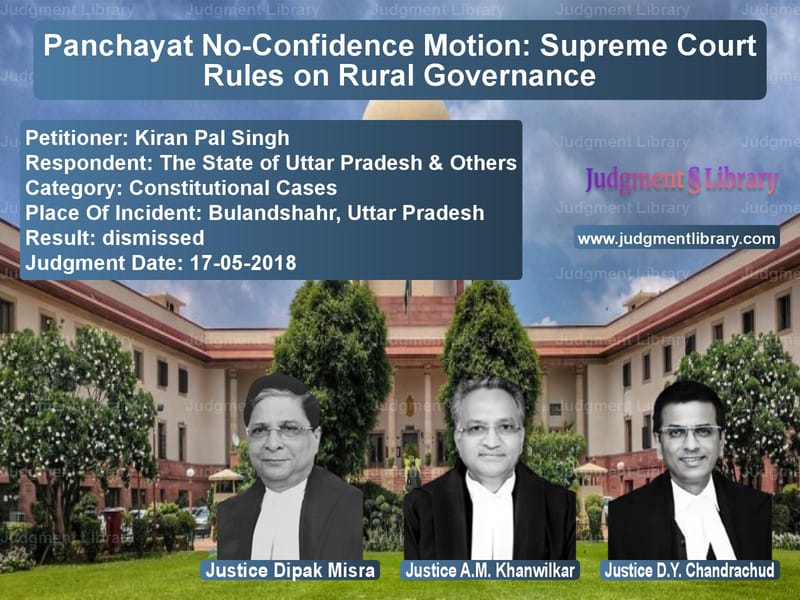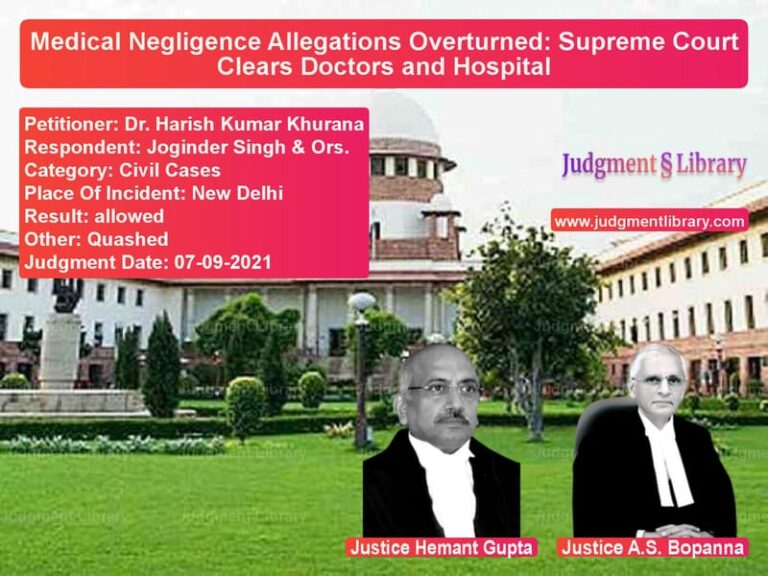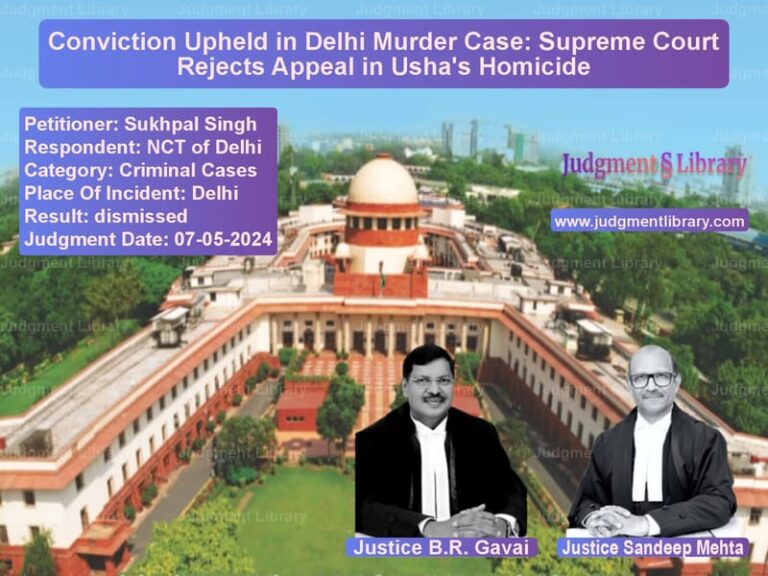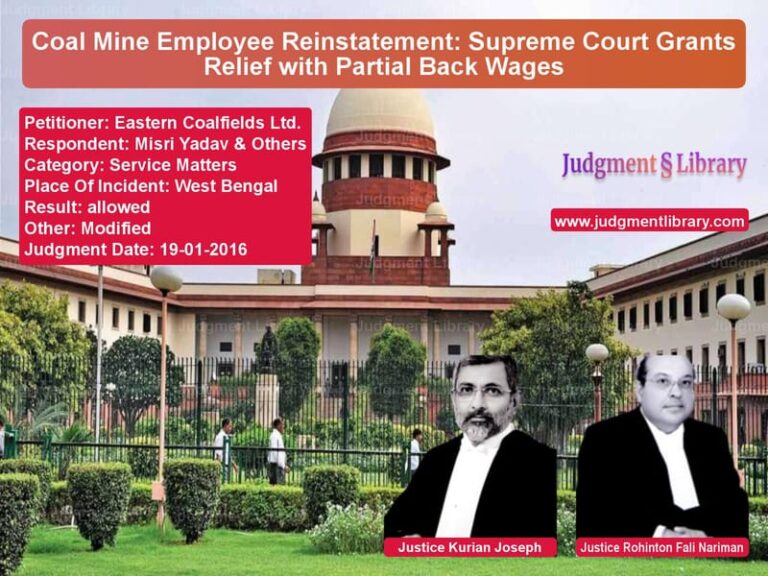Panchayat No-Confidence Motion: Supreme Court Rules on Rural Governance
The Supreme Court of India, on May 17, 2018, delivered a crucial ruling in Kiran Pal Singh vs. The State of Uttar Pradesh & Others. The case revolved around the legality of a no-confidence motion against the Pramukh (head) of a Kshettra Panchayat in Uttar Pradesh. The judgment clarified the procedural requirements for no-confidence motions under the Uttar Pradesh Kshettra Panchayats and Zila Panchayats Act, 1961.
This ruling underscored the importance of democratic principles in rural governance while balancing administrative stability and political accountability at the local government level.
Background of the Case
Kiran Pal Singh was elected as Pramukh of Kshettra Panchayat Vikash Khand Gulawati, District Bulandshahr, in 2015. A group of elected members submitted a no-confidence motion against him. The District Magistrate initially did not act on it, prompting one of the members to file a writ petition in the Allahabad High Court seeking direction for the motion to proceed.
After some procedural delays, another notice of no-confidence motion was delivered on October 31, 2017, with 35 members’ signatures. The District Magistrate scheduled a meeting for November 27, 2017, where the no-confidence motion was passed with 32 votes against the Pramukh. The post was declared vacant, and fresh elections were scheduled.
Singh challenged the second notice in the High Court, arguing that a prior motion of no-confidence had been attempted, and as per law, a second motion could not be considered within one year. The High Court dismissed his petition, leading to the present appeal in the Supreme Court.
Legal Questions Considered
- Did the second no-confidence motion violate the one-year restriction under Section 15(12) of the Uttar Pradesh Kshettra Panchayats and Zila Panchayats Act, 1961?
- Was the Collector’s decision to accept the second notice legally valid?
- Was the no-confidence motion conducted per statutory requirements?
- Did the High Court err in dismissing the petitioner’s challenge?
Petitioner’s Arguments
Kiran Pal Singh contended:
- The second no-confidence motion was illegal as a prior motion had already been initiated.
- As per Section 15(12) of the Act, once a motion is introduced and not carried, another motion cannot be moved for one year.
- The District Magistrate had no authority to accept the second motion.
- The High Court failed to consider that the statutory bar on repeated motions was intended to ensure administrative stability.
Respondent’s Arguments
The State of Uttar Pradesh and other respondents countered:
- The first motion was not actually voted upon as no meeting took place.
- Section 15(12) applies only when a motion has been introduced and voted down, or if the meeting fails due to a lack of quorum.
- The second motion was valid as it was a fresh attempt, and all procedural requirements were met.
- The High Court correctly dismissed the challenge since Singh had no valid legal claim.
Supreme Court’s Observations
The Supreme Court examined the language of Section 15(12) of the Act, which states:
“If the motion is not carried as aforesaid or if the meeting could not be held for want of quorum, no notice of any subsequent motion expressing want of confidence in the same Pramukh shall be received until after the expiration of one year from the date of such meeting.”
The Court held that for the statutory bar to apply, either:
- The motion must have been voted on and rejected.
- The meeting must have failed due to lack of quorum.
Since no such meeting had taken place, the bar under Section 15(12) did not apply.
The Court also noted:
“The one-year restriction applies only when a no-confidence motion has been formally considered and not carried. Mere submission of notice without actual proceedings does not trigger the statutory prohibition.”
The Court dismissed Singh’s argument that the Collector had exceeded his authority, affirming:
“The Collector’s role is administrative and limited to verifying compliance with procedural requirements. It is not within his jurisdiction to adjudicate substantive disputes on the motion’s validity.”
Final Judgment
The Supreme Court upheld the High Court’s ruling and dismissed Singh’s appeal. It concluded:
“The no-confidence motion was validly initiated and passed. The appellant’s challenge is devoid of merit and is accordingly dismissed.”
Key Takeaways from the Judgment
- The one-year statutory bar on no-confidence motions applies only when a previous motion has been formally voted upon or failed due to lack of quorum.
- Administrative officers have limited jurisdiction in reviewing procedural compliance but cannot adjudicate the motion’s validity.
- The ruling reinforces the principle that democratic accountability at the local level must be upheld while ensuring stability in governance.
- The judgment clarifies procedural intricacies in handling no-confidence motions under the Panchayat system.
This ruling provides clear guidelines on the legal framework governing no-confidence motions in local governance and ensures that elected representatives remain accountable while preventing misuse of procedural technicalities.
Petitioner Name: Kiran Pal Singh.Respondent Name: The State of Uttar Pradesh & Others.Judgment By: Justice Dipak Misra, Justice A.M. Khanwilkar, Justice D.Y. Chandrachud.Place Of Incident: Bulandshahr, Uttar Pradesh.Judgment Date: 17-05-2018.
Don’t miss out on the full details! Download the complete judgment in PDF format below and gain valuable insights instantly!
Download Judgment: Kiran Pal Singh vs The State of Uttar P Supreme Court of India Judgment Dated 17-05-2018.pdf
Direct Downlaod Judgment: Direct downlaod this Judgment
See all petitions in Fundamental Rights
See all petitions in Legislative Powers
See all petitions in Separation of Powers
See all petitions in Judgment by Dipak Misra
See all petitions in Judgment by A M Khanwilkar
See all petitions in Judgment by Dhananjaya Y Chandrachud
See all petitions in dismissed
See all petitions in supreme court of India judgments May 2018
See all petitions in 2018 judgments
See all posts in Constitutional Cases Category
See all allowed petitions in Constitutional Cases Category
See all Dismissed petitions in Constitutional Cases Category
See all partially allowed petitions in Constitutional Cases Category







